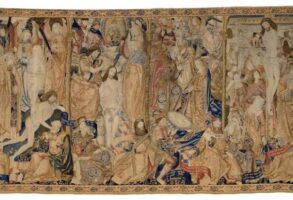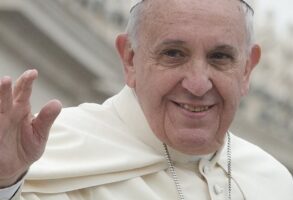Published June 22, 2015
Arguments about whether or not Pope Francis “gets the science right” in his new encyclical Laudato Si’ tend to miss the point rather badly. This is because the Pope’s forceful, and in many ways radical, critique of our modern world is not built upon a particular reading of the scientific literature (about which the Pope has no special authority to speak), but upon the Church’s understanding of the gift of creation and the place of man within creation—a subject about which the Pope and the Church do speak with authority.
Put another way, the Pope’s deepest critique of our contemporary world retains its full weight and significance regardless of whether one agrees with the Pope’s reading of the extent and causes of global climate change or not.
So while many have focused on the Pope’s rather grim reading of the present ecological crisis—global climate change, acidification of the oceans, loss of biodiversity, desertification, lack of access to clean water, etc.—as Matthew Schmitz points out in a thoughtful piece for the Washington Post, the encyclical hinges, not on a reading of the science, but on a diagnosis of an underlying spiritual crisis.
As evidence of the coming disaster, Francis adduces environmental calamities—climate change, pollution, deforestation, monoculture, extinction—and yet he leaves no doubt that the crisis is fundamentally a spiritual one. Its source is our desire to master and manipulate nature, which leads us to use technology that ends up mastering us.
The ecological and economic concerns addressed by the encyclical are symptoms of a fundamental breakdown in how we understand creation and, crucially, ourselves. “If the present ecological crisis is one small sign of the ethical, cultural and spiritual crisis of modernity,” Pope Francis insists, “we cannot presume to heal our relationship with nature and the environment without healing all fundamental human relationships.” (119)
So what is the deeper crisis? What is the root cause of the present ecological crisis Pope Francis sees as threatening our “common home”? It is a crisis of the human person. “There can be no ecology,” writes the Holy Father, “without an adequate anthropology.” (118) How can we understand the rest of creation unless we understand our own selves, who are part of that creation? And how can we understand ourselves, if we ignore, dismiss, or abuse creation of which we are part and to which our vocation as stewards obliges us?
If we take a fragmented view of the human person and human life—a view often encouraged by our politics, in which various issues are cobbled together to form this or that platform, which stands in opposition to and competition with other policy platforms—we can easily miss the integrity of the Church’s view of the whole human person, which includes our social nature, our place in the world, and our ultimate end, which is communion with God.
Earlier this year, I suggested that the “culture of death” described by Pope John Paul II and the “dictatorship of relativism” warned about by Pope Benedict XVI both describe facets of the same crisis Pope Francis has described as the “throwaway culture” and the “culture of waste.” This new encyclical makes this connection even clearer. For example, Pope Francis explicitly ties the defense of creation to the defense of human life and the family. Citing Pope John Paul II in Centesimus Annus, Francis writes:
I would stress the great importance of the family, which is “the place in which life – the gift of God – can be properly welcomed and protected against the many attacks to which it is exposed, and can develop in accordance with what constitutes authentic human growth. In the face of the so-called culture of death, the family is the heart of the culture of life”. In the family we first learn how to show love and respect for life; we are taught the proper use of things, order and cleanliness, respect for the local ecosystem and care for all creatures. In the family we receive an integral education, which enables us to grow harmoniously in personal maturity. (213)
The culture of life, of course, is incompatible with a view of the human person that places individual freedom and autonomy above our relationships and obligations to others and to the marvelous gift of creation God has entrusted to our care. The Holy Father makes this point directly and forcefully:
[C]oncern for the protection of nature is also incompatible with the justification of abortion. How can we genuinely teach the importance of concern for other vulnerable beings, however troublesome or inconvenient they may be, if we fail to protect a human embryo, even when its presence is uncomfortable and creates difficulties? (120)
As for the connection between relativism and the throwaway culture (and the ecological crisis), Pope Francis drives the point home hard:
The culture of relativism is the same disorder which drives one person to take advantage of another, to treat others as mere objects, imposing forced labor on them or enslaving them to pay their debts. The same kind of thinking leads to the sexual exploitation of children and abandonment of the elderly who no longer serve our interests. It is also the mindset of those who say: Let us allow the invisible forces of the market to regulate the economy, and consider their impact on society and nature as collateral damage. In the absence of objective truths or sound principles other than the satisfaction of our own desires and immediate needs, what limits can be placed on human trafficking, organized crime, the drug trade, commerce in blood diamonds and the fur of endangered species? Is it not the same relativistic logic which justifies buying the organs of the poor for resale or use in experimentation, or eliminating children because they are not what their parents wanted? This same “use and throw away” logic generates so much waste, because of the disordered desire to consume more than what is really necessary.
This encyclical is strong medicine; it challenges deep cultural assumptions held, often uncritically, by many on both the right and left of our politics. Above all it is a call to conversion, a call to discover (or rediscover) an understanding of creation in which we are not the center, but rather privileged witnesses to the glory and splendor of God made manifest in all his works—most especially in us.
One last thought: In reading Laudato Si, this deeply “Franciscan” encyclical of our Jesuit pope, I was reminded of the words written by St. Ignatius of Loyola at the outset of his Spiritual Exercises. The “Principle and Foundation” is a succinct statement of our origins, our end, and the proper ordering of all we encounter along the way. I leave his words here for your consideration and edification.
Principle and Foundation
Man is created to praise, reverence, and serve God our Lord, and by this means to save his soul.
And the other things on the face of the earth are created for man and that they may help him in prosecuting the end for which he is created.
From this it follows that man is to use them as much as they help him on to his end, and ought to rid himself of them so far as they hinder him as to it.
For this it is necessary to make ourselves indifferent to all created things in all that is allowed to the choice of our free will and is not prohibited to it; so that, on our part, we want not health rather than sickness, riches rather than poverty, honor rather than dishonor, long rather than short life, and so in all the rest; desiring and choosing only what is most conducive for us to the end for which we are created.
Stephen P. White is a fellow at the Ethics and Public Policy Center.










